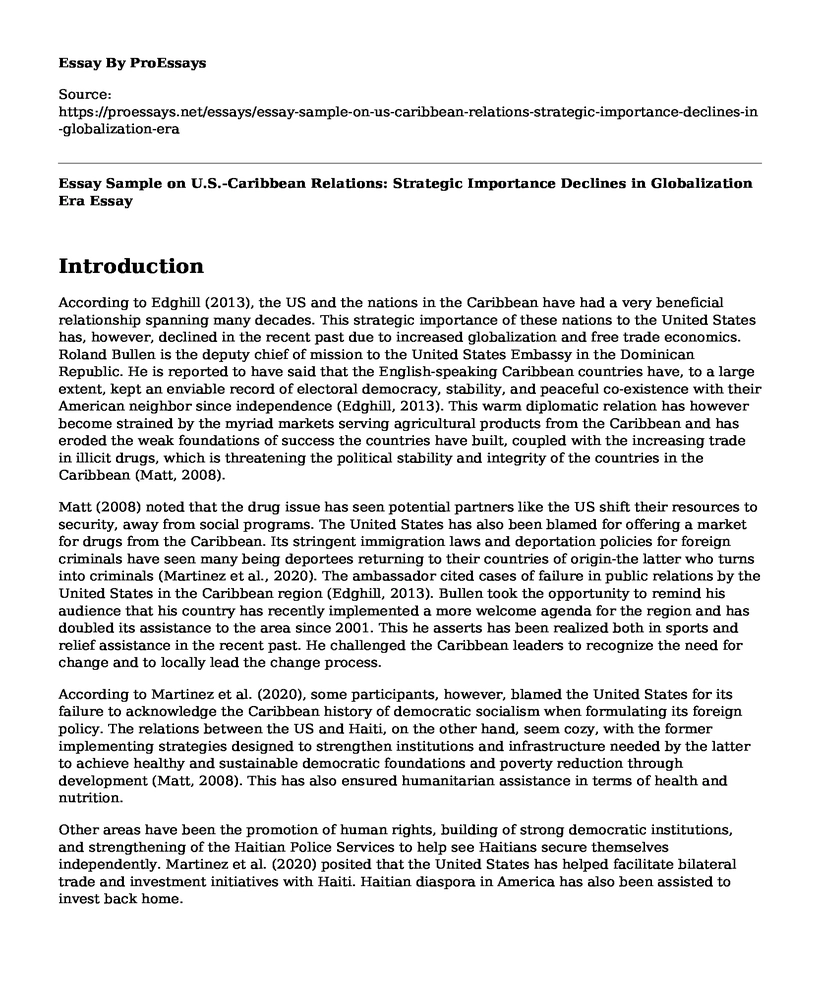Introduction
According to Edghill (2013), the US and the nations in the Caribbean have had a very beneficial relationship spanning many decades. This strategic importance of these nations to the United States has, however, declined in the recent past due to increased globalization and free trade economics. Roland Bullen is the deputy chief of mission to the United States Embassy in the Dominican Republic. He is reported to have said that the English-speaking Caribbean countries have, to a large extent, kept an enviable record of electoral democracy, stability, and peaceful co-existence with their American neighbor since independence (Edghill, 2013). This warm diplomatic relation has however become strained by the myriad markets serving agricultural products from the Caribbean and has eroded the weak foundations of success the countries have built, coupled with the increasing trade in illicit drugs, which is threatening the political stability and integrity of the countries in the Caribbean (Matt, 2008).
Matt (2008) noted that the drug issue has seen potential partners like the US shift their resources to security, away from social programs. The United States has also been blamed for offering a market for drugs from the Caribbean. Its stringent immigration laws and deportation policies for foreign criminals have seen many being deportees returning to their countries of origin-the latter who turns into criminals (Martinez et al., 2020). The ambassador cited cases of failure in public relations by the United States in the Caribbean region (Edghill, 2013). Bullen took the opportunity to remind his audience that his country has recently implemented a more welcome agenda for the region and has doubled its assistance to the area since 2001. This he asserts has been realized both in sports and relief assistance in the recent past. He challenged the Caribbean leaders to recognize the need for change and to locally lead the change process.
According to Martinez et al. (2020), some participants, however, blamed the United States for its failure to acknowledge the Caribbean history of democratic socialism when formulating its foreign policy. The relations between the US and Haiti, on the other hand, seem cozy, with the former implementing strategies designed to strengthen institutions and infrastructure needed by the latter to achieve healthy and sustainable democratic foundations and poverty reduction through development (Matt, 2008). This has also ensured humanitarian assistance in terms of health and nutrition.
Other areas have been the promotion of human rights, building of strong democratic institutions, and strengthening of the Haitian Police Services to help see Haitians secure themselves independently. Martinez et al. (2020) posited that the United States has helped facilitate bilateral trade and investment initiatives with Haiti. Haitian diaspora in America has also been assisted to invest back home.
Positioning Statement for a State PR Campaign
For any country in the Caribbean looking for a bilateral partner in matters of trade, security, and general development, the United States of America is your best bet. The US, unlike other nations, is cognizant of and upholds human rights as an inalienable right and will ensure a mutually beneficial relationship devoid of any discriminative and exploitative tendencies.
Relevance to International Public Relations
This positioning statement will be relevant to US international public relations with other countries in general, as it is one that touches on the three parameters of the relationship held dear by all countries. It resonates well with the issues most countries are grappling with, including trade, insecurity, and development. Also, with the 'mutual benefit' mantra, the policy will take into consideration the expectations and aspirations of the partner states.
References
Edghill, M. W. (2013, May 30). A new day for U.S.-Caribbean relations [Blog post]. Retrieved on 3/24/2020 at 11 am from HYPERLINK "http://www.americasquarterly.org/new-day-us-caribbean relations
Martinez, J. L., Chami, G., Montoute, A., & Mohammed, D. A. (2020). Advancements in the Cuba-US Relationship. In Changing Cuba-US Relations (pp. 61-92). Palgrave Macmillan, Cham.
Matt, V. (2008, February 26). U.S. and Caribbean nations share goals, diplomat says. The Brown Daily Herald. Retrieved on 3/24/2020 at 11 am from https://www.state.gov/u-s- relations-with-haiti/
Cite this page
Essay Sample on U.S.-Caribbean Relations: Strategic Importance Declines in Globalization Era. (2023, May 02). Retrieved from https://proessays.net/essays/essay-sample-on-us-caribbean-relations-strategic-importance-declines-in-globalization-era
If you are the original author of this essay and no longer wish to have it published on the ProEssays website, please click below to request its removal:
- UAE Red Crescent Continues to Make a Difference Essay
- A Discussion on Trade Agreements and Trans-Border Flows of Labor in Saudi Arabia
- Paper Example on Global Trade: Enhancing Development Through Technology & World Trade Organization
- Essay Example on US-China Trade War: Top Leaders' Phone Call to Resume Negotiations
- Free Trade: Removing Barriers to Encourage Trade - Essay Sample
- Trade Wars: Impact on Global Businesses and Governments - Essay Sample
- Paper Example on Trade, Politics, and the Great Game: The Eastern Question Explored







